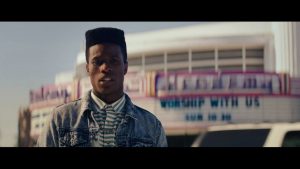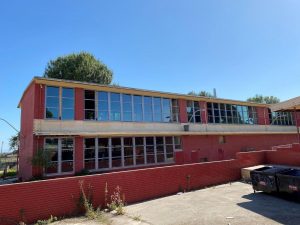
On the surface, Dope is a typical coming-of-age story about how anyone can be anything, regardless of the stereotypes the world places on them. However, these stereotypes are frequently subverted in ways that grow the characters in the story. Nowhere is this more evident than with the main character, Malcolm Adekanbi, played by Shameik Moore. The character of Malcolm is based around his creator, writer and director Rick Famuyiwa. Like Malcolm, Famuyiwa grew up in Inglewood where he felt torn between two worlds, not really fitting in either. In many interviews about the film, he describes Dope as a sort of ‘what if’ scenario based on a real interaction he had with a drug dealer in his neighborhood. In the film, this interaction is the first conversation between Malcolm and Dom. [1. Gross, Terry. October 16, 2015. “‘Dope’ Director On Geekdom, The N-Word, And Confronting Racism With Comedy.” Fresh Air on NPR.]
At the start of the movie, Malcolm is already both breaking and fulfilling stereotypes. He and his friends don’t fit in with the environment that they live in. They are constantly bullied by the Bloods who also go to school with him, and Malcolm seeks a way out by going to Harvard. During a scene early on in the movie, Malcolm presents his college essay, “A Research Thesis To Discover Ice Cube’s Good Day,” to his school’s guidance counselor. He doesn’t want to, in his words, “write about the typical ‘I’m from a poor, crime-filled neighborhood, raised by a single mother, don’t know my dad, blah blah.’ It’s cliche,” (0:08). He knows what is expected, not only of those who typically grow up in poor neighborhoods but also what is expected of those who “make it out.” He doesn’t want to fit in either box, charting his own path. As Director Rick Famuyiwa, who Malcolm is partially based on, said to The Washington Post, “Malcolm did not want to be defined in the way that his guidance counselor of an older generation was used to defining things… He was very much about — I think to a fault, early in the movie — wanting to define himself against things.”[2. McDonald, Soraya Nadia. June 19, 2015. “Bitcoin, the Brat Pack and blackness: director Rick Famuyiwa talks about ‘Dope’.” The Washington Post.] Malcolm is so concerned with the different boxes he sees in the community he is growing up in that he is unable to see how all of these different aspects of his life come together to create who he is: “by the end of the movie, [Malcolm] comes into a realization that all these things do define him and it’s up to him to figure out who he is … I think for a lot of kids who grow up in places like this, the pressure is still there but at least now there’s more of an outlet for people than there was before,” Famuyiwa explained to the Post.[3. McDonald, Soraya Nadia. June 19, 2015. “Bitcoin, the Brat Pack and blackness: director Rick Famuyiwa talks about ‘Dope’.” The Washington Post.]
Nowhere is this evolution of Malcolm’s character more evident than in the second college essay Malcolm writes. This essay acts as a summation of everything Malcolm learns throughout Dope. He juxtaposes two students: one is a straight-A student who lives in the suburbs and likes to spend time with his friends, talking about music and TV, the other grew up in a poor neighborhood, lives with a single mother and sells drugs for his income. Malcolm then asks the reader to guess which one of these students he is. Malcolm says that he has constantly spent his life being pulled between these two realities, never really fitting in with either one, either due to his own character or how others perceive him. However, as Malcolm so poignantly says, “I’m slowly starting to see maybe it’s a blessing,” (1:32). He is able to learn from all the different influences in his life and bring a new perspective to the table. The experiences Malcolm has in Dope expand his worldview beyond his narrow slice of Los Angeles. Everyone he meets and every challenge he faces, regardless of whether it is finishing a college essay, dealing with bullies, or creating a crypto-based ecstasy store, has contributed to Malcolm as a person, and that is what he will bring to Harvard.

Malcolm’s college story, while not unheard of, is exceedingly rare, especially for someone from Inglewood. Out of the 169 students from Morningside High School, a real-life school not far from where Dope takes place, only 39% attended college after graduation. Out of those students, all but two went to schools outside of the state of California.[4. “2019-20 College-Going Rate for California High School Students by Postsecondary Institution Type: Morningside High Report.” California Department of Education. https://dq.cde.ca.gov/dataquest/DQCensus/CGR.aspx?agglevel=School&cds=19646341936046&year=2019-20] This is far below the statewide average, where almost 10% of students going to college went out of state. While, due to privacy restrictions, it can’t be known where those two students from Morningside went to college, seeing as Harvard has an acceptance rate of only around 4%, it is safe to assume that these students likely did not go to Harvard.[5. Amponsah, Michelle N. and Emma H. Hairdar. March 31, 2023 “Harvard College Accepts 3.41% of Applicants to Class of 2027.” The Harvard Crimson.]